German shepherds are known for their intelligence and work ethic. These beautiful dogs are large but loyal and can help humans complete a variety of jobs. They are an ideal breed for active households and can be trained to protect their home. In spite of their noble reputation, there are a number of common German shepherd health problems that you should consider before adopting one.
Below are the most common German shepherd health problems, the symptoms of each condition, and what can be done to prevent or improve them if possible.
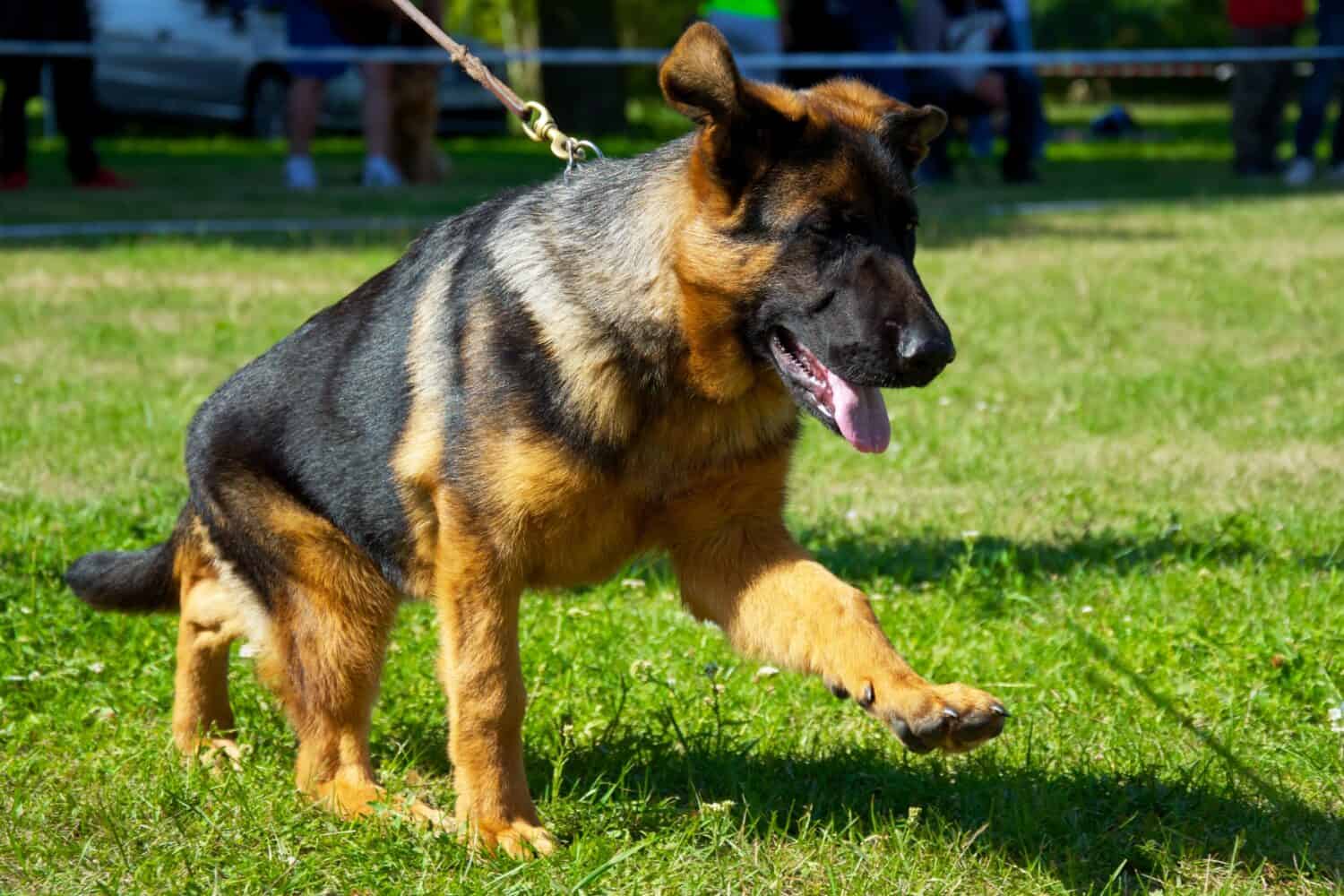
The most common with which German shepherds struggle is hip dysplasia.
©Uzo Borewicz/Shutterstock.com
1. Hip Dysplasia
Hip dysplasia is the most common health problem German shepherds experience. An abnormality in the hip joint causes the hip socket to only partially cover the ball portion, causing painful joint dislocation. The condition is a congenital or inherited condition that affects large dog breeds.
Signs of hip dysplasia include decreased activity, limping or bunny hopping (also known as ataxic gait), and stiffness. These symptoms can begin as soon as birth, but it’s uncommon to occur before one year. Changes in diet and exercise can improve symptoms. Some dogs may also be a candidate for surgery depending on the severity of the condition.

While hip and elbow dysplasia affect many German shepherds, that doesn’t stop them from loving playtime.
©Rita_Kochmarjova/Shutterstock.com
2. Elbow Dysplasia
Like hip dysplasia, elbow dysplasia is another congenital condition affecting large dog breeds, especially German shepherds. This condition occurs when the elbow joint doesn’t develop properly, typically involving the growth of cartilage and the surrounding areas. Elbow dysplasia begins as a primary lesion, which refers to the abnormal breakdown of the joint.
The condition causes chronic pain, making walking difficult for dogs. And it’s not uncommon for it to be present in both elbows. Symptoms include limping, a decreased range of motion, and bulging or swollen elbows. Physical therapy, limited exercise, weight management, and medication are a few treatment options.
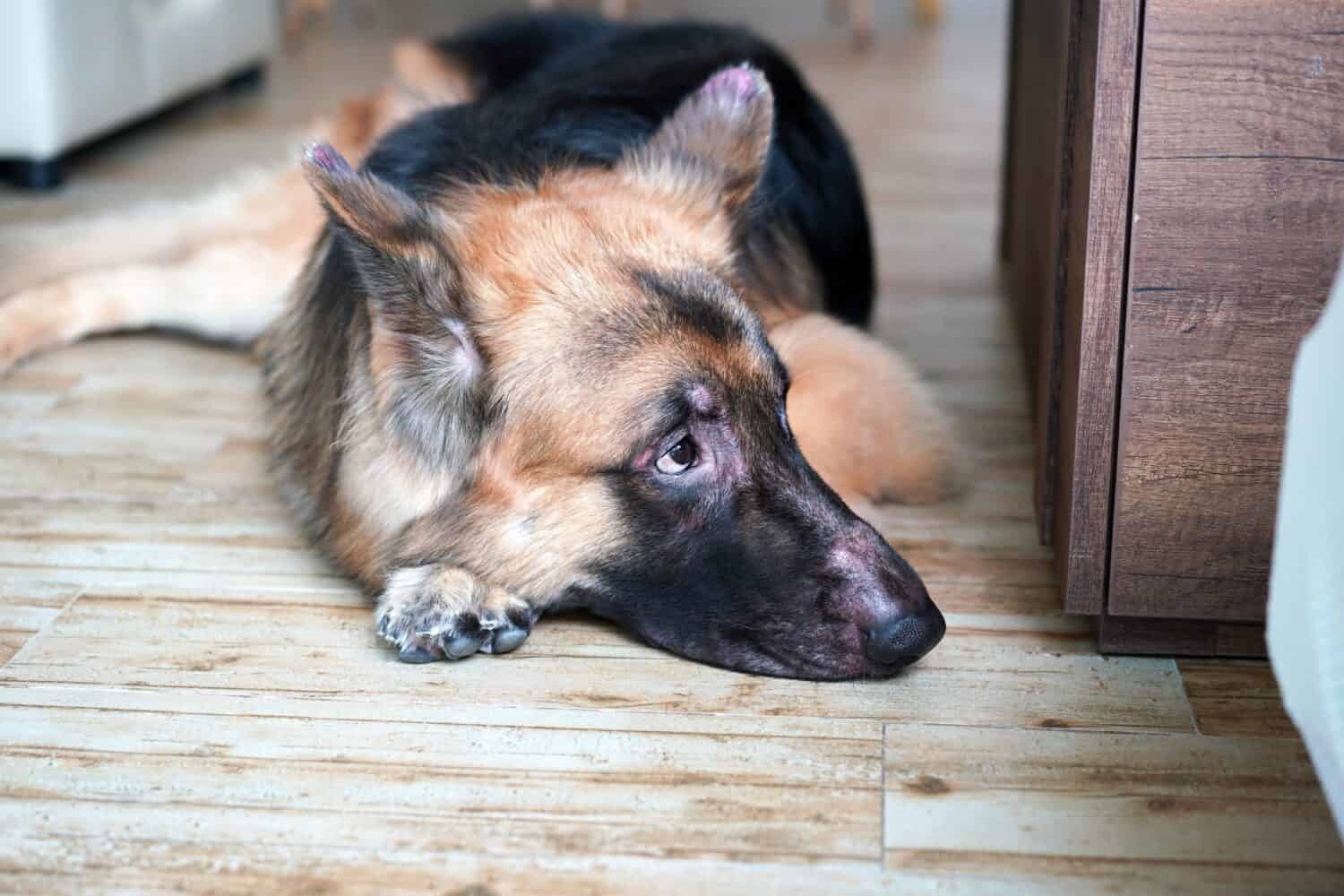
Allergies are particularly common in German shepherds.
©Vach cameraman/Shutterstock.com
3. Allergies
German shepherds are more susceptible to allergies than other dog breeds. Allergies can include environmental allergies like grass, pollen, or food-based. Dogs with food-based allergies often cannot eat chicken, corn, rice, or grain but can include other food types.
The most common way to tell if your German shepherd has allergies is red, itchy, and irritated skin. Your vet may recommend a special diet to meet your dog’s specific nutritional needs in addition to hypoallergenic products or medication.

Dogs who suffer from diabetes must receive a special diet.
©Snezhana_G/Shutterstock.com
4. Diabetes
Diabetes is a common health condition in German shepherds due to their large size and eating habits. As with humans, diabetes in dogs can be genetic or develop later in life. Symptoms include fatigue, dry mouth, excessive drinking, and excessive urination. Diabetes is maintained with diet and exercise.
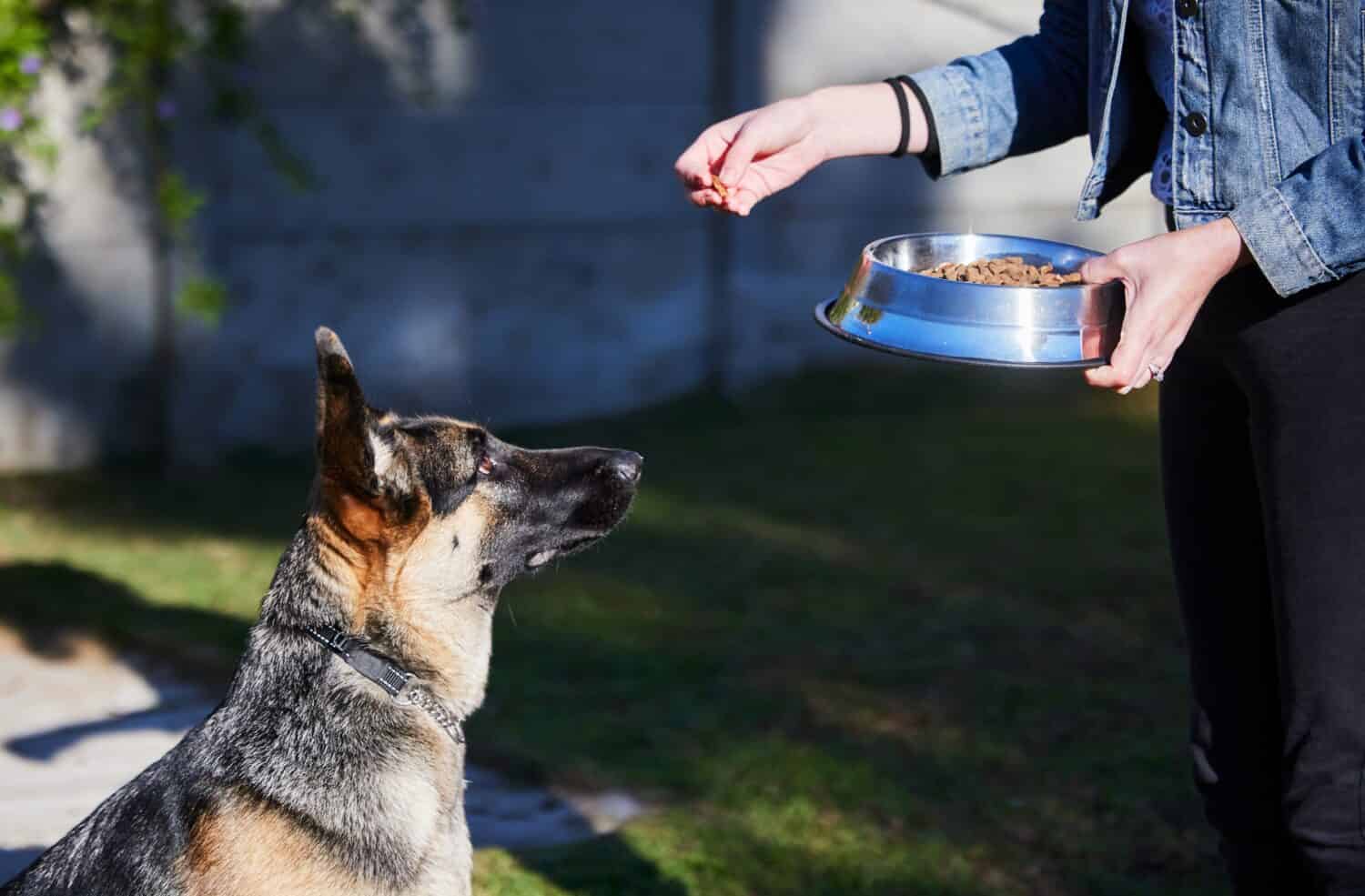
Dogs who only eat one large meal a day are more susceptible to GDV.
©PeopleImages.com – Yuri A/Shutterstock.com
5. Gastric Dilatation and Volvulus (GDV)
Large dogs, including German shepherds, are at high risk of experiencing gastric dilatation and volvulus (GDV), also known as bloating. This fatal condition occurs when too much air, food, or fluid builds up in the stomach, preventing gas from being expelled and cutting off blood flow. Gastric dilatation and volvulus often occur after eating or exercising, causing the stomach to bloat and twist suddenly.
Dogs who eat quickly, only eat one large meal a day, or eat from a raised bowl are more susceptible to bloat. If your dog begins retching, vomiting, excessively drooling, or has an extended abdomen after eating or exercising, see a vet immediately. Eating smaller meals throughout the day, using puzzle toys to slow eating, and taking long breaks between eating and exercising lower the risk of GDV.

If you suspect perianal fistulas are a problem for your German shepherd, seek veterinary care for treatment options.
©Korneeva Kristina/Shutterstock.com
6. Perianal Fistulas
Also known as anal furunculosis, it is one of the most common and severe German shepherd health problems. The perianal is the area around the anus, while the fistula refers to an abnormal connection between the tissues of the anal sac and the anal duct.
Perianal fistulas are characterized by chronic, smelly, pus-producing boils in the anal region and surrounding skin of a dog’s behind. These fistulas result from impaction or infection of the anal glands but can be related to an autoimmune disease. Keeping the area clean, various types of medication and surgery can control the condition maintained.
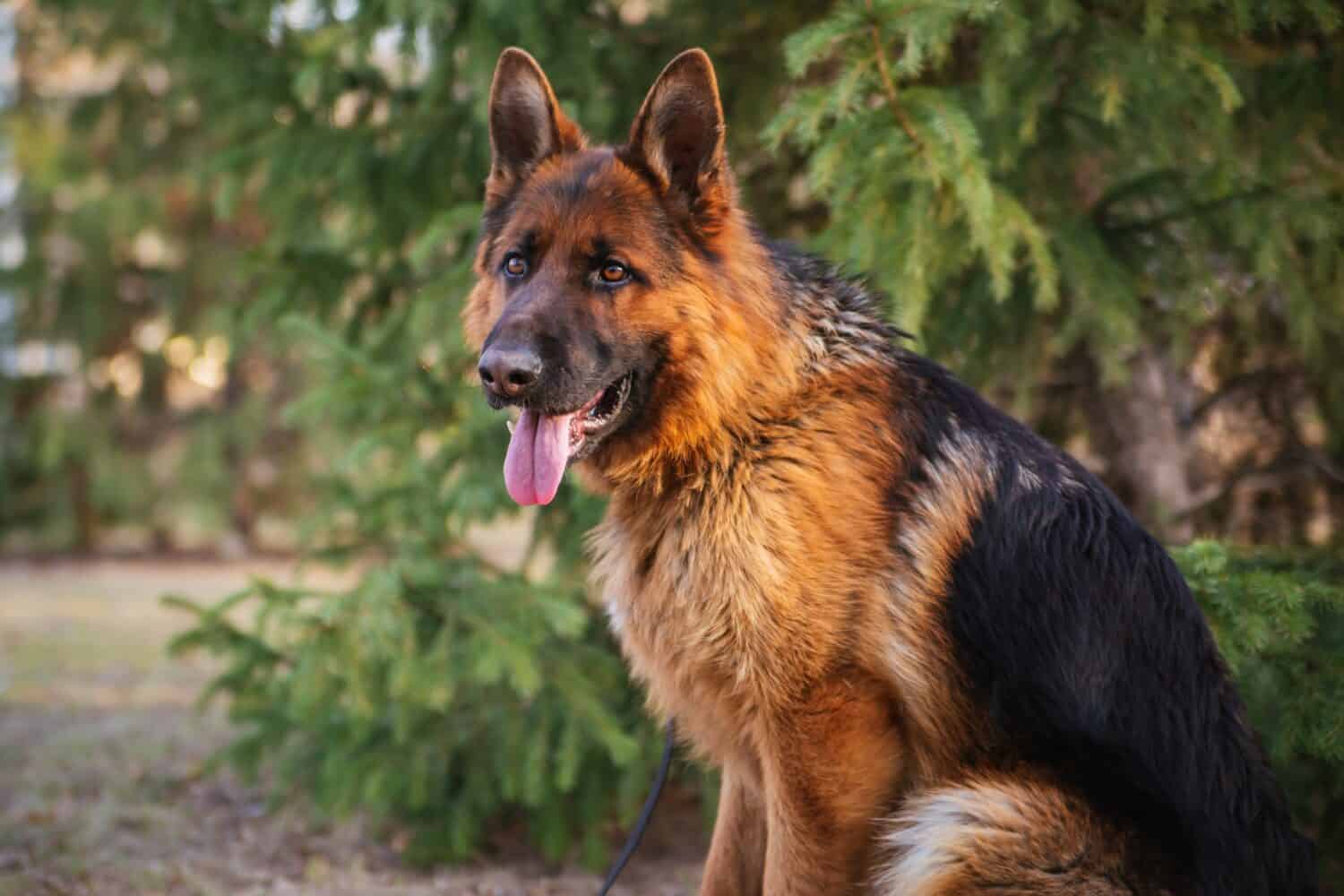
Urate bladder stones are the most serious variant a German shepherd can experience.
©VeronArt16/Shutterstock.com
7. Bladder Stones
Bladder stones are another common German Shepherd health problem. They are crystallized minerals that form in the kidneys and then move into the bladder in the shape of stones. There are two common types of bladder stones: urate bladder stones and struvite bladder stones.
Urate bladder stones are hereditary and the most serious, as they can require surgery and don’t respond well to standard treatment. On the other hand, struvite bladder stones often dissolve but can sometimes remain sold to cause painful stones. Symptoms of bladder stones include frequent urination, bloody urine, trouble urinating, and grit visible in the urine.

Pannus is a common and hereditary eye problem.
©DarSzach/Shutterstock.com
8. Pannus
Also called chronic superficial keratitis, one of the most common hereditary eye problems German shepherds experience is Pannus. This progressive disease affects the cornea of the eye. It often appears as a gray or pink film which can change into a darker shade covering the cornea in one or both eyes.
However, if the vet catches Pannus early, they can recommend treatment options to prevent worsening symptoms. Environmental factors such as UV rays and high altitudes can exacerbate symptoms.
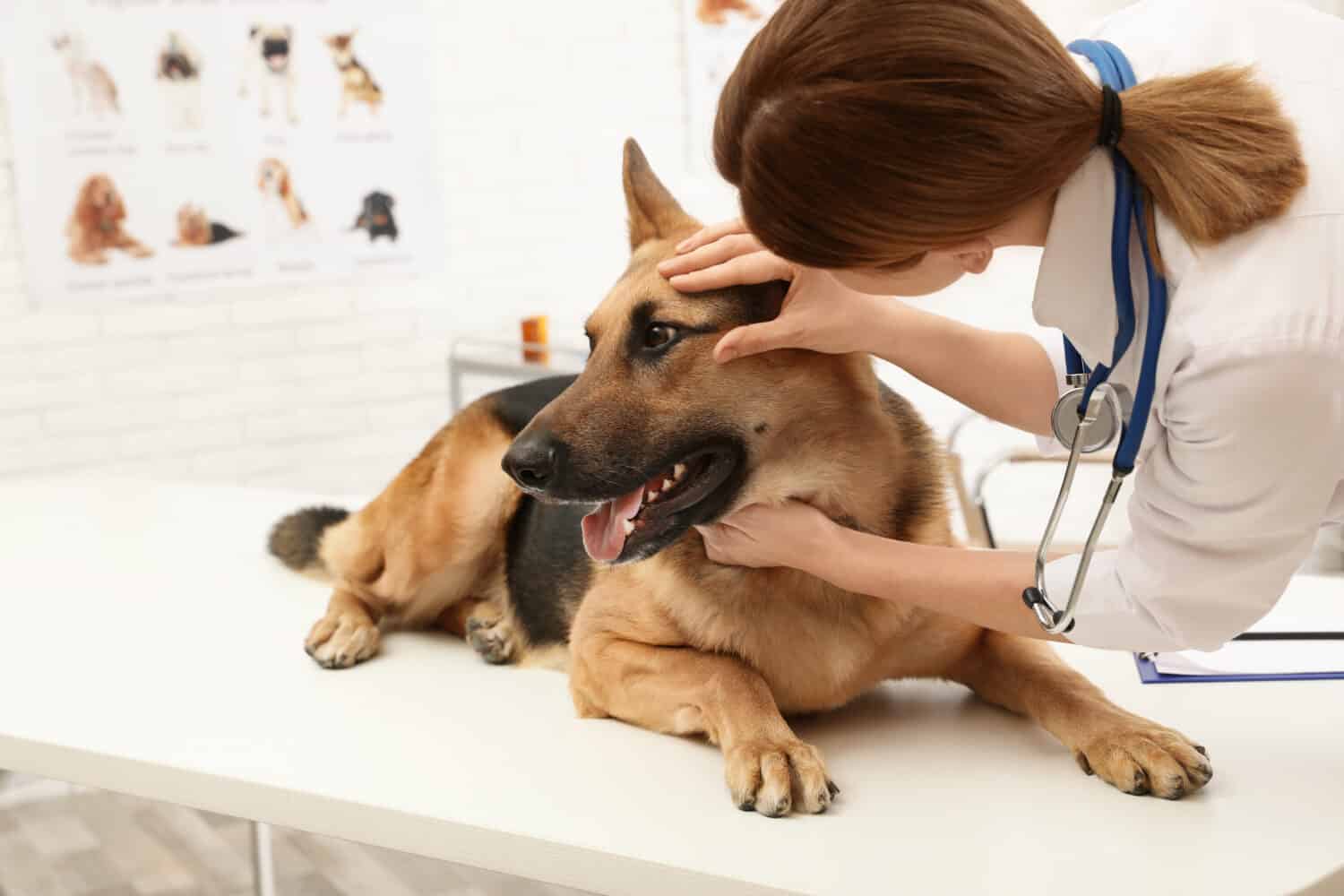
If you suspect your dog has a condition that is negatively affecting its quality of life, a veterinarian can help.
©New Africa/Shutterstock.com
9. Progressive Retinal Atrophy (PRA)
Progressive Retinal Atrophy (PRA) and Central Progressive Retinal Atrophy (CPRA) are two of the most common German Shepherd health problems that affect the retina. Both conditions typically display symptoms around two years of age and are degenerative.
PRA is not painful, but the hereditary condition affects a dog’s ability to detect light, movement, and color, ultimately causing them to go blind. Dogs experiencing PRA will have difficulty seeing in the dark, following visual signals and commands, and may bump into objects.

As a degenerative condition, cataracts worsen over time.
©Vach cameraman/Shutterstock.com
10. Cataracts
Cataracts are the leading cause of blindness in older German shepherds. The lenses of the eyes become opaque or cloudy. Cataracts can form due to age, an eye injury, or underlying health conditions such as diabetes.
Surgery can remove cataracts or the eye altogether if the condition is worse. Cataracts are a degenerative condition, meaning it worsens over time and can lead to chronic pain and blindness.

Pano affects the growth of a German shepherd’s leg bones.
©Happy monkey/Shutterstock.com
11. Panosteitis
Panosteitis or “Pano” is another common German shepherd health problem that affects the development and growth of the long bones in their legs. The condition is not exclusive to German shepherds; however, their large size makes them more susceptible to developing limb problems. Panosteitis often goes away after 18 months, but a lack of intervention can cause permanent damage to the bones or damage.

Spine problems can arise as a German shepherd ages.
©Rita_Kochmarjova/Shutterstock.com
12. Intervertebral Disc Disease (IVDD)
It’s not uncommon for German shepherds to have problems with their spines as they age. Some GSDs are more susceptible to the disease, and it’s more likely to develop earlier. IVDD occurs naturally due to wear on the spinal disks. As dog’s age, the discs between the vertebrae break down, causing pain in the neck and back and the loss of mobility.
Since the disease is degenerative, maintenance is the only way to prevent the disease from progressing rapidly. Physical therapy, medication, surgery, and limited activity are the best forms of treatment for IVDD.
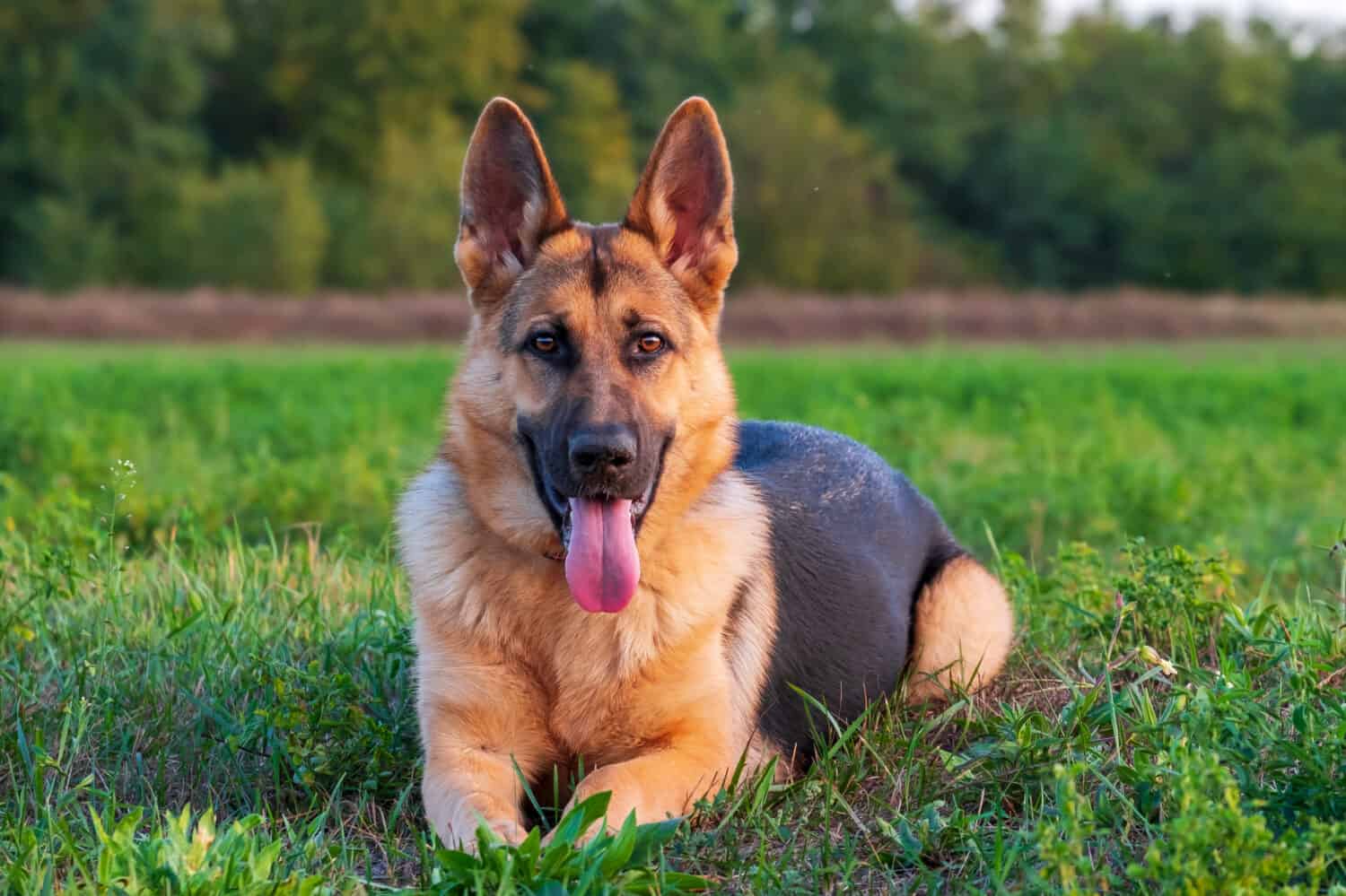
DM is a degenerative disease that causes limb weakness and paralysis.
©Barat Roland/Shutterstock.com
13. Degenerative Myelopathy (DM)
Similar to ALS or Lou Gehrig’s disease, degenerative myelopathy is a neurological condition that affects the spinal cord, causing progressive limb weakness and paralysis. German shepherds are more susceptible to DM than other breeds, but genetic tests are available to determine if your dog is at risk.
Early symptoms of DM resemble osteoarthritis and hip dysplasia, making diagnosis challenging. Trouble walking, standing, and incontinence are often the first signs of DM. Fortunately, German shepherds can undergo rehabilitation, acupuncture therapy, exercise, and use dietary supplements to manage symptoms.

A dog that is suffering from osteoarthritis may obsessively lick its paw.
©Lukreo/Shutterstock.com
14. Osteoarthritis
Also, just referred to as arthritis, it affects the skeletal system. German shepherds with arthritis experience chronic pain and swelling in their joints. The condition limits their ability to move. Signs of osteoarthritis include limping, ataxia, frequently licking joints, and decreased movement. Maintaining their weight, using ramps when needed, and providing medication or supplements can manage the condition.

If a German shepherd has epilepsy, in many cases, it will experience its first seizure between 6 months and 3 years old.
©Cloud Bursted/Shutterstock.com
15. Epilepsy
German shepherds are commonly affected by primary or idiopathic epilepsy. This form of epilepsy is inherited. German shepherds with this form of epilepsy often have their first seizure between 6 months to 3 years old.
In the event of a seizure, give them space to prevent injury, but don’t touch their mouth or tongue. If you suspect your German shepherd has epilepsy, a vet can provide a diagnosis with a blood test and prescribe medication.
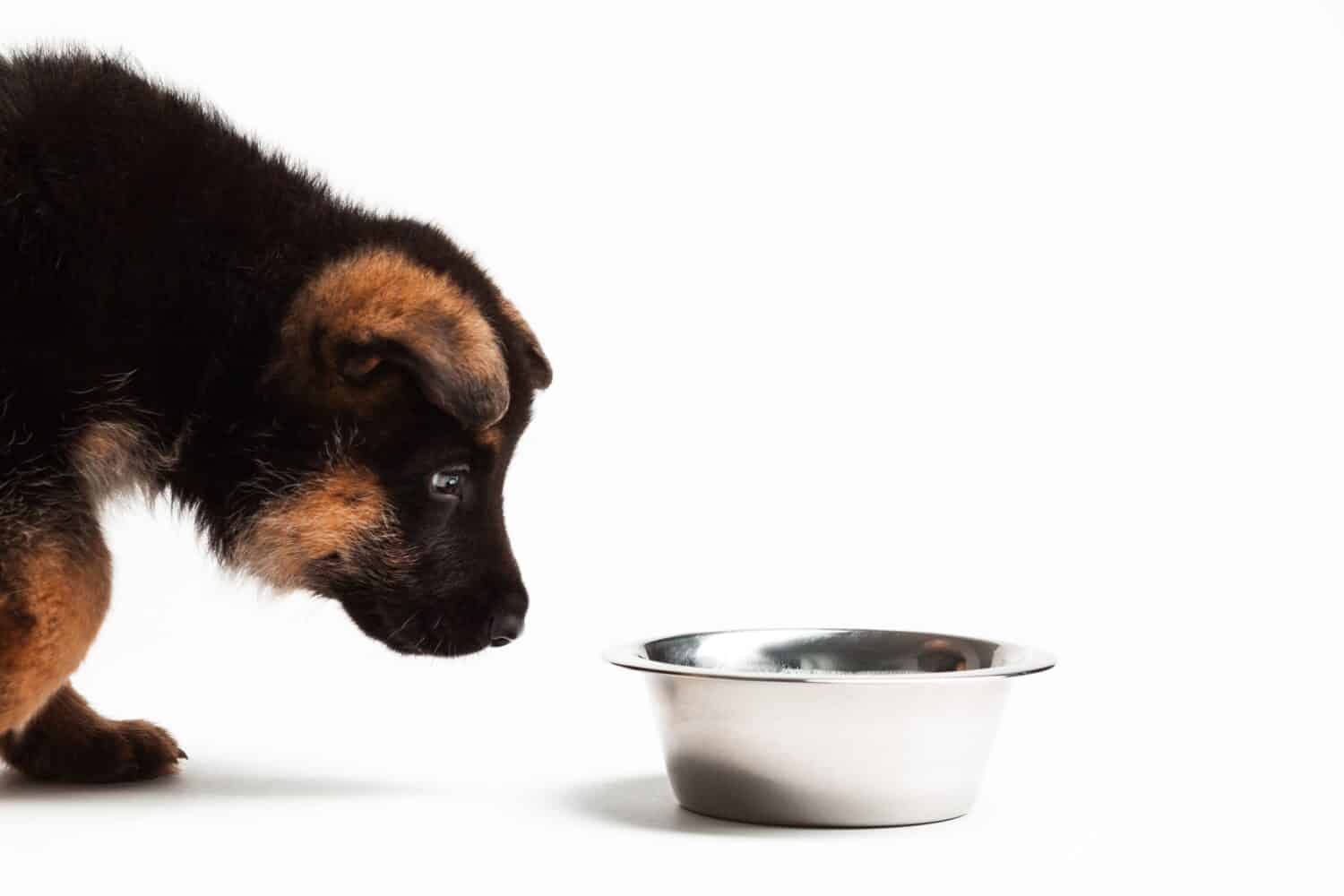
If a dog has CIM, its enlarged esophagus will pose problems with swallowing food.
©SoloveyNadia/Shutterstock.com
16. Congenital Idiopathic Megaesophagus (CIM)
German shepherds are predisposed to another inherited disorder, the congenital idiopathic megaesophagus (CIM). With this condition, puppies develop an enlarged esophagus that cannot move food down the digestive tract. Puppies with CIM often regurgitate their food because they cannot eat correctly.
Underlying neurological conditions or other disorders sometimes cause a canine megaesophagus and can be treated with the right help. Small, frequent meals, eating vertically, and medication may help treat CIM in German shepherds.

Even if a German shepherd’s diet is healthy, if it has EPI, it will have problems absorbing the nutrients.
©Korneeva Kristina/Shutterstock.com
17. Exocrine Pancreatic Insufficiency (EPI)
Exocrine Pancreatic Insufficiency (EPI) refers to the inability of the pancreas to produce enough enzymes to digest carbohydrates, fats, and proteins in food. German shepherds with this condition cannot absorb the proper nutrients despite having a healthy diet, causing them to be hungry and malnourished.
EPI can be diagnosed with a blood test within the first six months of their life. However, if it goes untreated, your dog will starve to death. Treatment options include lifelong supplements, antibiotics, and other medication to ensure they receive nutrients.
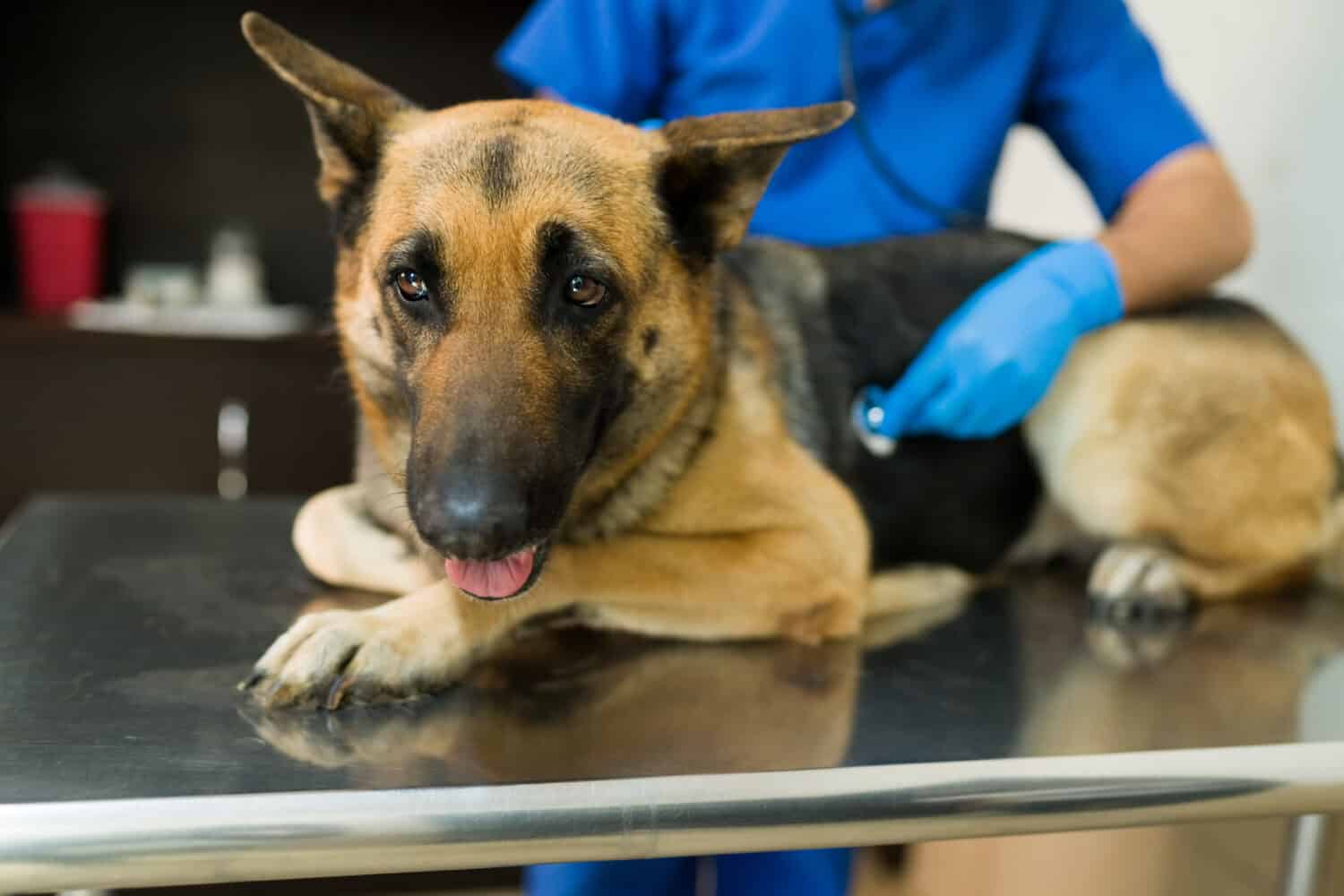
SLE is common in large dogs who are over the age of 5.
©Beach Creatives/Shutterstock.com
18. Systemic Lupus Erythematosus (SLE)
Lupus is a multi-systemic autoimmune disease that causes a dog’s immune system to attack its tissues. SLE is most common in German shepherds and other large dogs over 5 but can affect dogs as young as 6 months old. Signs of SLE often occur slowly over time and vary according to the affected area.
Treatment also depends on the parts of the body affected. Vets can prescribe systemic and topical medications, while short-term veterinary stays may be required. Your vet may also recommend restricted physical activity, modified diets, and limited sun exposure.
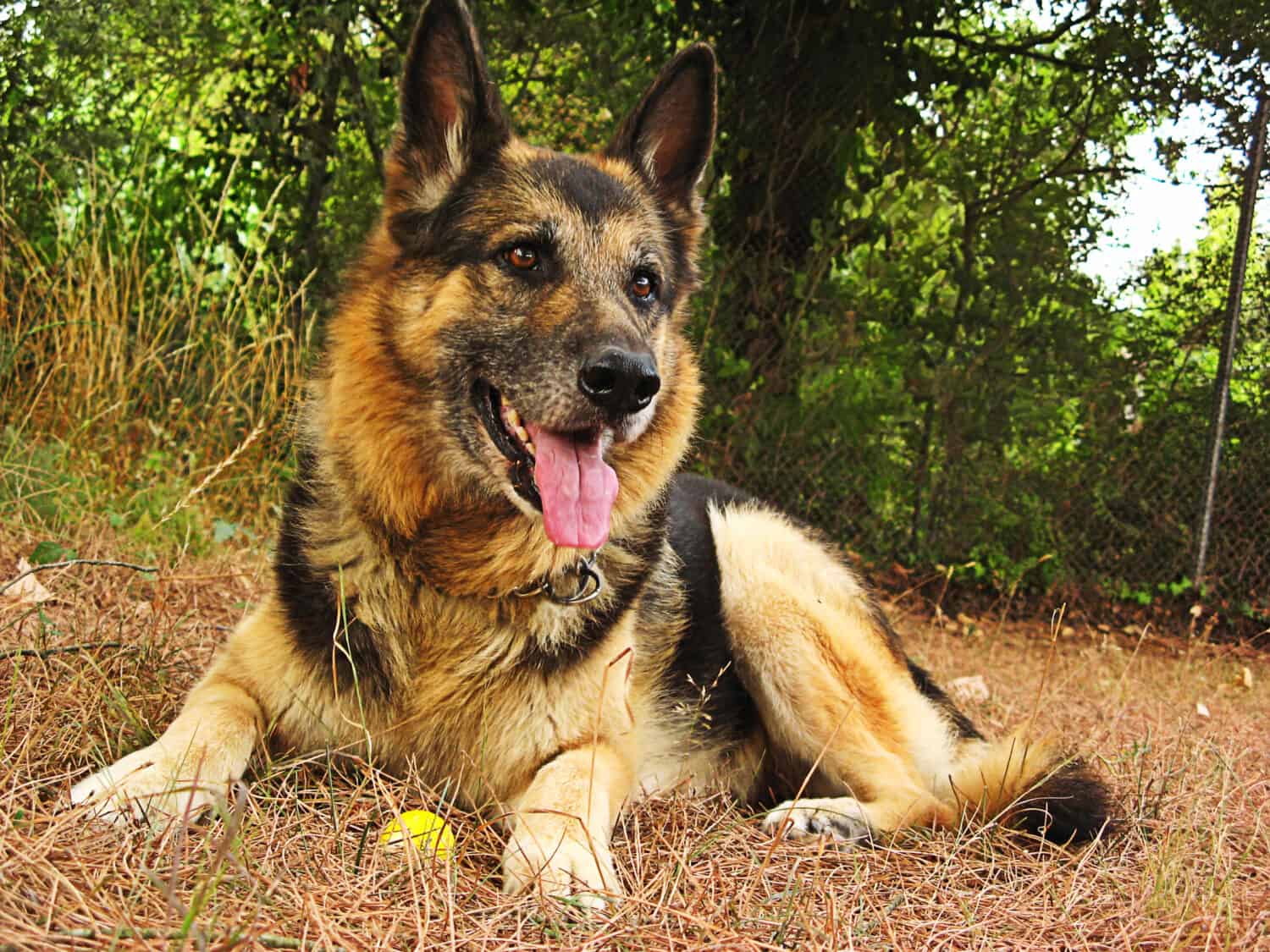
While Doberman pinschers are the most at risk for Von Willebrand Disease, it can also affect German shepherds.
©Ingrid Prats/Shutterstock.com
19. Von Willebrand Disease
One of the most common bleeding disorders in humans and dogs is Von Willebrand Disease. This inherited blood disorder is the result of a deficiency in the protein Von Willebrand factor (vWF), which is necessary for helping platelets stick together to form blood clots.
Doberman pinschers are the most at risk for vWF, but German shepherds are also at risk. Excessive bleeding following a wound or surgery is the main symptom. There is no cure, but monitoring and transfusions help dogs live healthy lives.

If you suspect any of these conditions in your dog, seeking veterinary care is the first step to helping it live a better life.
©Stephm2506/Shutterstock.com
20. Hemophilia
Another common bleeding disorder present in German shepherds is hemophilia A. This inherited coagulation disorder is caused by a deficiency in factor VIII (F8), which also prevents proper blood clotting. The most common form of treatment is therapy and transfusions.
Summary of Common German Shepherd Health Problems
| German Shepherd Health Problems | |
|---|---|
| #1 | Hip Dysplasia |
| #2 | Elbow Dysplasia |
| #3 | Allergies |
| #4 | Diabetes |
| #5 | Gastric Dilatation and Volvulus (GDV) |
| #6 | Perianal Fistulas |
| #7 | Bladder Stones |
| #8 | Pannus |
| #9 | Progressive Retinal Atrophy (PRA) |
| #10 | Cataracts |
| #11 | Panosteitis |
| #12 | Intervertebral Disc Disease (IVDD) |
| #13 | Degenerative Myelopathy (DM) |
| #14 | Osteoarthritis |
| #15 | Epilepsy |
| #16 | Congenital Idiopathic Megaesophagus (CIM) |
| #17 | Exocrine Pancreatic Insufficiency (EPI) |
| #18 | Systemic Lupus Erythematosus (SLE) |
| #19 | Von Willebrand Disease |
| #20 | Hemophilia |
Ready to discover the top 10 cutest dog breeds in the entire world?
How about the fastest dogs, the largest dogs and those that are -- quite frankly -- just the kindest dogs on the planet? Each day, AZ Animals sends out lists just like this to our thousands of email subscribers. And the best part? It's FREE. Join today by entering your email below.
Thank you for reading! Have some feedback for us? Contact the AZ Animals editorial team.








